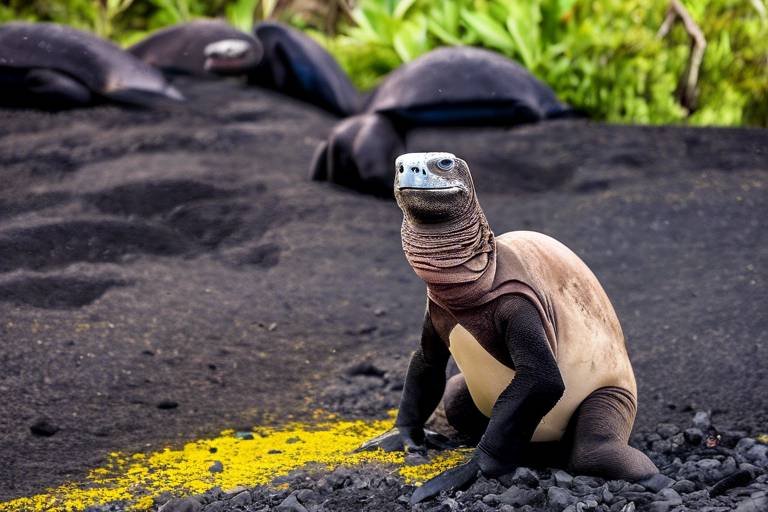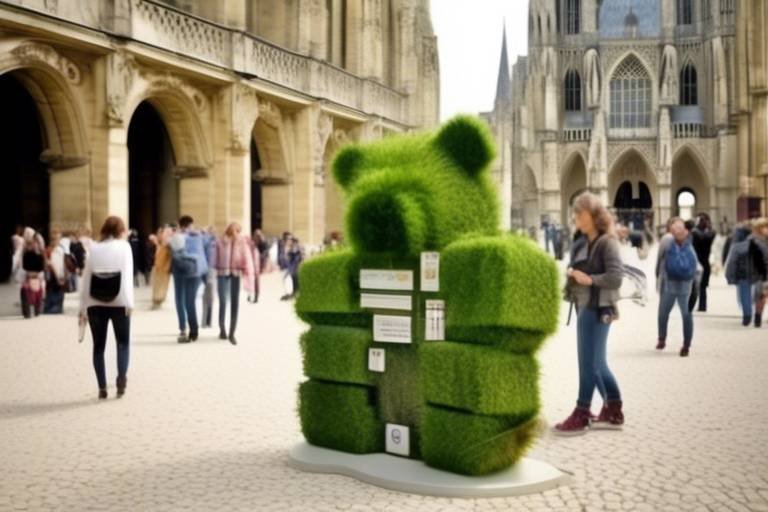How to Travel Responsibly in the Galápagos Islands
When embarking on a journey to the Galápagos Islands, it is essential to approach travel with a mindset of responsibility and sustainability. This unique archipelago, renowned for its remarkable biodiversity and pristine landscapes, requires visitors to respect and protect its delicate ecosystem. By following a few key principles, travelers can ensure that their exploration of the Galápagos Islands is not only memorable but also environmentally conscious and ethical.
Understanding the Fragile Ecosystem
Understanding the Fragile Ecosystem of the Galápagos Islands is crucial for visitors to appreciate the delicate balance that exists within this unique environment. The islands are home to a vast array of endemic species, from the famous Galápagos tortoises to the elusive marine iguanas. Each plant and animal plays a vital role in the ecosystem, contributing to its overall health and sustainability.
By immersing oneself in the diverse flora and fauna of the Galápagos Islands, visitors can gain a deeper appreciation for the interconnectedness of all living beings. The volcanic landscapes, pristine beaches, and crystal-clear waters offer a glimpse into a world where nature reigns supreme. It is essential to recognize the fragility of this ecosystem and the need to protect it for future generations.
Preserving the delicate balance of the Galápagos Islands requires a collective effort from both locals and tourists. Understanding the impact of human activities on the environment is key to promoting responsible tourism practices. By treading lightly and respecting the natural habitat, visitors can help safeguard the ecological harmony that defines the Galápagos Islands.
Through education and awareness, travelers can become ambassadors for conservation and sustainability. By learning about the fragile ecosystem of the Galápagos Islands, visitors can actively contribute to the preservation of this natural wonder. Every action, no matter how small, can make a difference in protecting the biodiversity and beauty of these enchanting islands.
Respecting Wildlife and Nature
When exploring the Galápagos Islands, it is crucial to respect the wildlife and nature that call this unique ecosystem home. By following guidelines on interacting with the wildlife and adhering to park rules, visitors can minimize their impact on the natural habitat and contribute to the preservation of this delicate environment.
One of the key principles of responsible tourism in the Galápagos Islands is to maintain a safe distance from wildlife. This not only ensures the safety of both visitors and animals but also preserves the natural behaviors of the species. By observing from a distance, travelers can appreciate the beauty of the wildlife without disrupting their natural routines.
Additionally, it is essential to avoid feeding or touching the animals to prevent habituation and maintain the wild nature of the creatures. By refraining from interacting with the wildlife in an intrusive manner, visitors can show their respect for the natural environment and contribute to the conservation efforts in the Galápagos Islands.
Moreover, following designated trails and pathways while exploring the islands helps minimize human impact on the ecosystem. By staying on marked routes, travelers can avoid trampling on sensitive vegetation and habitats, preserving the natural landscape for future generations to enjoy.
Responsible tourism also involves educating oneself about the local flora and fauna to better understand the significance of preserving the biodiversity of the Galápagos Islands. By learning about the unique species and ecosystems, visitors can develop a deeper appreciation for the natural wonders of this remarkable destination and become advocates for conservation.
Choosing Sustainable Accommodations
Choosing sustainable accommodations in the Galápagos Islands is crucial for minimizing your environmental impact while supporting local communities and conservation efforts. By opting for eco-friendly lodging options, you can enjoy a comfortable stay while contributing to the preservation of this unique ecosystem.
When selecting accommodations, look for hotels and lodges that have implemented sustainable practices such as water conservation, energy efficiency, and waste management. These establishments often prioritize using local materials, supporting community projects, and minimizing their carbon footprint.
Additionally, consider staying in eco-friendly resorts that are certified by recognized sustainability programs or organizations. These certifications ensure that the accommodations meet specific environmental criteria and adhere to responsible tourism practices.
Supporting sustainable accommodations in the Galápagos Islands not only benefits the environment but also provides a more authentic and enriching experience for travelers. By choosing to stay in eco-conscious establishments, you can contribute to the conservation of this pristine archipelago and help preserve its natural beauty for future generations to enjoy.
Supporting Local Conservation Projects
When it comes to traveling responsibly in the Galápagos Islands, supporting local conservation projects plays a crucial role in preserving this unique ecosystem for future generations. By actively engaging with initiatives and organizations dedicated to protecting the islands, travelers can contribute to the sustainability and conservation efforts that are essential for the well-being of the environment.
Local conservation projects in the Galápagos Islands focus on a variety of areas, including wildlife protection, habitat restoration, and environmental education. These projects are often led by passionate individuals and organizations that work tirelessly to safeguard the natural beauty and biodiversity of the islands.
One way travelers can support local conservation projects is by participating in volunteer programs that allow them to directly contribute to conservation efforts. These programs often involve activities such as habitat restoration, wildlife monitoring, and beach clean-ups, providing a hands-on experience that fosters a deeper connection to the environment.
Additionally, travelers can make a positive impact by donating to reputable conservation organizations that operate in the Galápagos Islands. These donations help fund essential conservation projects, research initiatives, and community outreach programs that are vital for protecting the islands’ fragile ecosystem.
Furthermore, supporting eco-friendly businesses and tour operators that prioritize sustainability and conservation practices is another way to contribute to local conservation projects. By choosing responsible travel options that minimize environmental impact and support the local community, travelers can help ensure the long-term preservation of the Galápagos Islands.
Minimizing Plastic Waste
When it comes to traveling responsibly in the Galápagos Islands, one crucial aspect to consider is minimizing plastic waste. The pristine beauty of this unique ecosystem can be easily marred by the presence of single-use plastics, threatening the delicate balance of marine and terrestrial life. By taking simple yet impactful steps, visitors can contribute to the preservation of the Galápagos Islands for future generations.
One effective way to minimize plastic waste is to carry a reusable water bottle and refill it from filtered water stations available in many accommodations and public areas. This not only reduces the consumption of plastic water bottles but also helps in keeping the islands free from plastic pollution.
Additionally, travelers can opt for eco-friendly products such as reusable shopping bags, straws, and containers to avoid contributing to the plastic waste problem. By being mindful of their consumption habits and making sustainable choices, visitors can significantly reduce their environmental footprint during their time in the Galápagos Islands.
Participating in beach clean-up activities organized by local conservation groups is another way to actively contribute to the preservation of the islands. These initiatives not only help in removing existing plastic waste from the beaches but also raise awareness about the importance of keeping the environment clean and plastic-free.
Furthermore, supporting businesses and accommodations that have implemented plastic reduction policies and initiatives can make a significant difference. By choosing to stay at eco-friendly lodges and hotels that prioritize sustainability, travelers can align their values with their actions and promote responsible tourism practices in the Galápagos Islands.
Responsible Snorkeling and Diving
When it comes to exploring the underwater wonders of the Galápagos Islands, responsible snorkeling and diving practices are essential to protect the marine ecosystem and its inhabitants. By following guidelines and being mindful of your impact, you can enjoy these activities while ensuring the preservation of this unique environment.
One crucial aspect of responsible snorkeling and diving is to respect the marine life and their habitats. Avoid touching or disturbing the creatures you encounter, as this can disrupt their natural behavior and cause stress. Keeping a safe distance and observing from afar allows you to appreciate the beauty of the underwater world without causing harm.
Additionally, it is vital to choose reputable tour operators and guides who prioritize environmental conservation and follow sustainable practices. These professionals can provide valuable insights on how to interact responsibly with the marine environment and ensure that your activities have minimal impact.
Before diving or snorkeling, familiarize yourself with the rules and regulations set by the Galápagos National Park. These guidelines are designed to protect the fragile ecosystem and ensure that visitors can enjoy these activities in a sustainable manner. By following these rules, you contribute to the preservation of the marine biodiversity of the islands.
Participating in conservation initiatives such as reef clean-ups and monitoring programs can also make a positive difference during your snorkeling and diving excursions. By actively engaging in efforts to protect the marine environment, you become a steward of the oceans and contribute to the long-term sustainability of the Galápagos Islands.
Remember, every action you take underwater has an impact on the delicate balance of the marine ecosystem. By practicing responsible snorkeling and diving, you not only safeguard the underwater world for future generations but also have a more meaningful and enriching experience exploring the remarkable biodiversity of the Galápagos Islands.
Respecting Cultural Heritage
When visiting the Galápagos Islands, it’s essential to not only appreciate the stunning natural beauty but also to respect the rich cultural heritage of the local communities. These islands have a history that goes beyond their remarkable wildlife and ecosystems. Interacting respectfully with the residents, learning about their traditions, and supporting their crafts can enhance your travel experience while contributing to the preservation of their unique way of life.
One way to immerse yourself in the cultural heritage of the Galápagos Islands is by engaging with local artisans and purchasing handmade souvenirs. These crafts not only serve as beautiful mementos of your trip but also help sustain traditional practices that have been passed down through generations. By supporting local artists and artisans, you are investing in the preservation of cultural heritage.
Additionally, taking the time to learn about the history and customs of the Galápagos Islands can deepen your connection to the place and its people. Whether it’s through guided tours of historical sites, visits to local museums, or conversations with residents, every interaction offers a chance to appreciate the richness of the island’s cultural tapestry.
Respecting cultural heritage also means being mindful of local traditions and customs. From the way you dress to the way you greet others, small gestures of respect can go a long way in showing appreciation for the local way of life. By embracing the customs of the Galápagos Islands, you not only show respect for the residents but also create meaningful connections that transcend language barriers.
Leaving Only Footprints
When it comes to traveling responsibly in the Galápagos Islands, the mantra “leave only footprints” encapsulates the essence of preserving this pristine environment for future generations. Imagine walking along a secluded beach, the soft sand beneath your feet, the gentle ocean breeze caressing your skin, and all around you, the untouched beauty of nature. This is the experience we strive to maintain for all who visit this unique archipelago.
As you explore the wonders of the Galápagos Islands, it is crucial to remember that every action we take has an impact on the delicate ecosystem. Just as a single footprint in the sand leaves a mark, our collective presence can shape the future of this extraordinary place. By treading lightly and respecting the natural surroundings, we can ensure that the Galápagos Islands remain a haven for biodiversity and wonder.
One way to minimize our footprint is to follow designated trails and pathways while exploring the islands. These routes are carefully planned to offer access to the beauty of the Galápagos while minimizing disturbance to sensitive habitats. By staying on these marked paths, we can enjoy the sights and sounds of nature without causing harm to the flora and fauna that call this place home.
Additionally, adopting a “leave nothing behind” mindset is essential in preserving the pristine beauty of the Galápagos Islands. This means carrying out all waste, including biodegradable items, and disposing of it responsibly in designated areas. By taking our trash with us and leaving no trace of our presence, we can ensure that the natural environment remains unspoiled for future visitors to enjoy.
Just as each footprint tells a story of where we have been, let us make sure that the tale we leave behind in the Galápagos Islands is one of respect, admiration, and conservation. Together, we can protect this extraordinary ecosystem and create a sustainable future where travelers can continue to be inspired by the beauty of these islands for years to come.
Frequently Asked Questions
- What is responsible tourism in the Galápagos Islands?
Responsible tourism in the Galápagos Islands involves making conscious choices to minimize your environmental impact, support local communities, and preserve the delicate ecosystem of the islands. It focuses on sustainable practices that benefit both the environment and the local population.
- How can I interact with wildlife responsibly?
When interacting with wildlife in the Galápagos Islands, it is essential to maintain a safe distance, avoid feeding or touching animals, and follow the guidelines set by the national park authorities. By respecting the natural behavior of the wildlife, you can help protect their habitat and well-being.
- Why is minimizing plastic waste important in the Galápagos?
Minimizing plastic waste is crucial in the Galápagos Islands to prevent pollution of the marine environment and protect the diverse marine life. By reducing single-use plastics, recycling, and participating in clean-up activities, visitors can contribute to keeping the islands pristine and free of plastic pollution.
- How can I support local conservation projects in the Galápagos?
You can support local conservation projects in the Galápagos Islands by volunteering with organizations dedicated to environmental protection, donating to conservation initiatives, or choosing eco-friendly tour operators and accommodations that contribute to conservation efforts. Your support can help safeguard the unique biodiversity of the islands.
- What are the benefits of choosing sustainable accommodations?
Choosing sustainable accommodations in the Galápagos Islands not only minimizes your environmental footprint but also supports local communities and conservation initiatives. Eco-friendly lodging options often promote responsible tourism practices, offer unique cultural experiences, and contribute to the preservation of the natural environment.
Eco-friendly, Wildlife protection, Local communities, Sustainable tourism, Conservation efforts, Respectful behavior, Pack light, Follow rules, , Eco-friendly, Wildlife protection, Local communities, Sustainable tourism, Conservation efforts, Respectful behavior, Pack light, Follow rules,
Share this content:














Post Comment